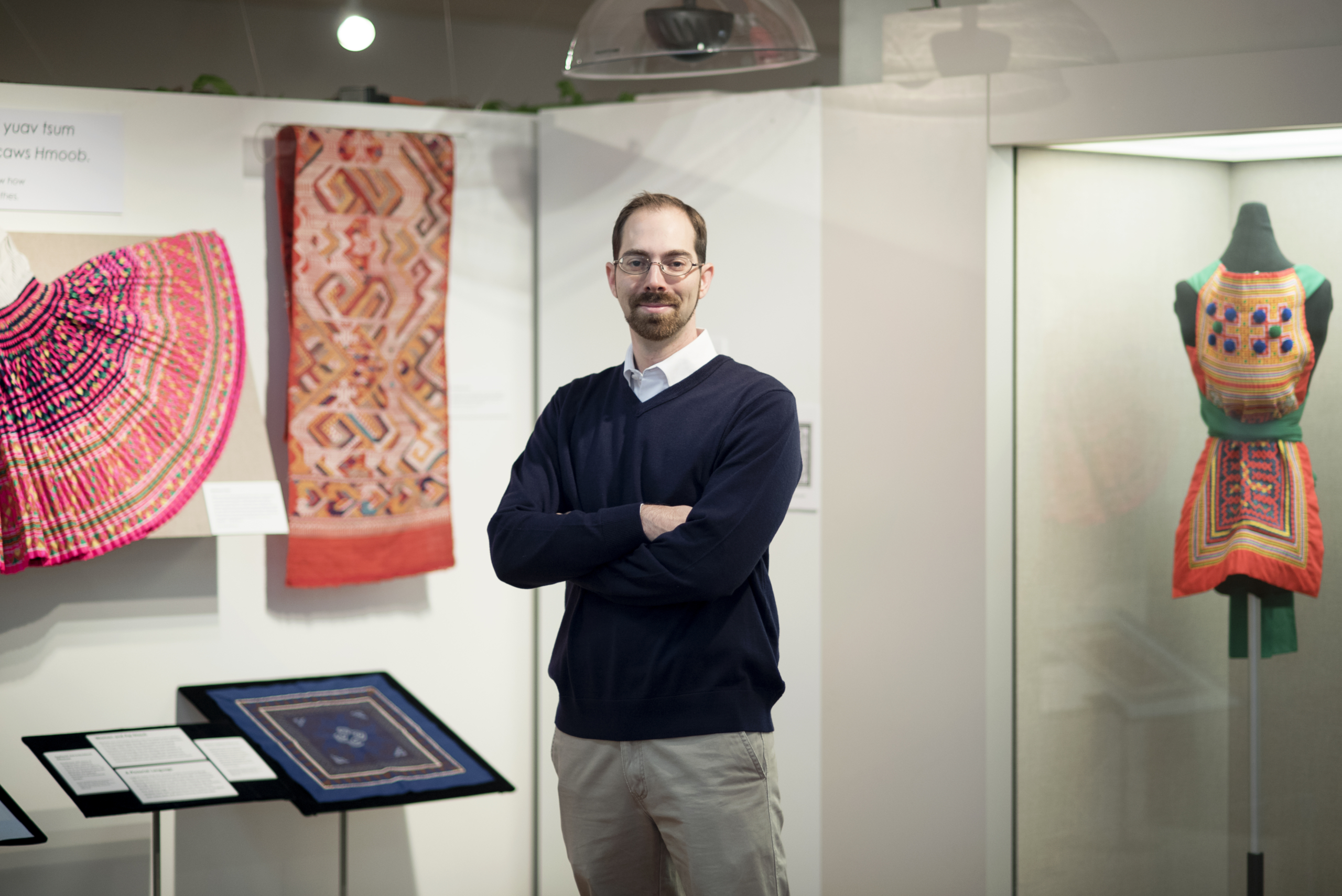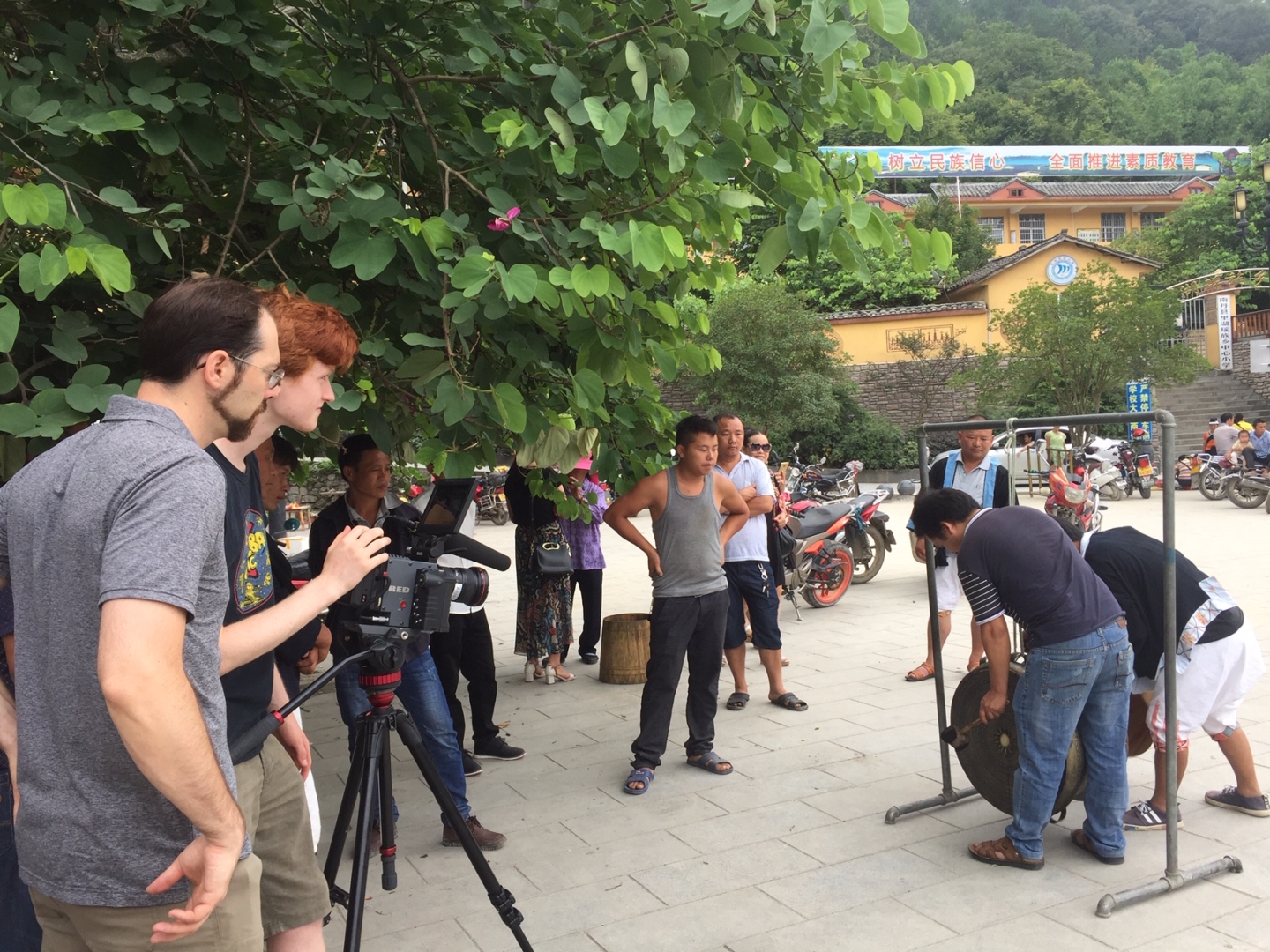Office Hours: Anthropology Faculty and Documentarian Will Nitzky

Will Nitzki, Faculty member in the Anthropology Department, is photographed in the Hmong exhibit at the Valene L. Smith Museum of Anthropology on Friday, January 20 2017. (Jessica Bartlett/ Student Photographer)
Will Nitzky is a busy man. He pulls triple duty as co-director of Chico State’s Valene L. Smith Museum of Anthropology and as a professor in the Department of Anthropology where he teaches 10 classes at the undergraduate and graduate levels in addition to being the coordinator for the museum studies certificate. Yet, he still finds time to conduct his research on topics that affect ethnic minority communities in China, some of which was translated into his first documentary, Bang the Drum, which was released in May. Nitzky provided a glance of what he contributes to the Chico Experience and the powerful reason he chose to feature the remote ethnic Yao village of Huaili, China, in his directorial debut.
Nitzky Fact #1
His favorite class to teach is “Exhibition Research, Design and Installation” (ANTH 467).
Considering the recent COVID-19 stay-at-home orders, has operating the museum virtually been challenging?
It’s different. Georgia Fox (co-director), Adrian Scott (head curator), Heather McCafferty (assistant curator), and I sat down and said, “How can we [as a teaching museum] satisfy educators that are looking for still-lacking formal education through museums?” So, we created a virtual tour of the Unbroken Traditions exhibition (originally curated by two graduate students). We also created online activities for Earth Day. We’re also rolling out a lot more social media posts this summer, and right now we’re preparing [for fall], knowing numbers are still going to be online. We’re going to be rolling out a video series for students, we’re going to be rolling out more online educational curricula [instead of the tangible activities used previously] for K–12. It’ll be a virtual museum—a museum in a box.
Nitzky Fact #2
He has conducted fieldwork in China since 2000.
You’re originally from upstate New York. How did you come to work for Chico State?
I’m originally from Woodstock, New York, but before I came to Chico, I was living in Japan with my family. My PhD work focused on rural China, specifically in southwest China, and what different ethnic minorities are facing with the rapid changes happening in China. Chico State was looking for someone to focus on the anthropology of Asia. In addition to that, they were looking for someone who had experience and specialization in museum studies.
Nitzky Fact #3
He is fluent in Chinese and knows “a little” Japanese.

That worked out well. Why did you pick that area as your research focus?
My journey started 20 years ago. My junior year of college I went to study abroad in China. Beijing was changing radically [in 1999]. And I had the opportunity to travel to different parts of China, the western Northwestern regions of Xinjiang, and also the sub-southern regions of Tibet. So I encountered a lot of different ethnic minority groups in those areas. I could see the fast changes that were happening in urban centers like Beijing and Shanghai. And these rural, ethnically diverse rural regions were also changing, but in a different way. I was really struck by what was happening in these people’s lives.
Nitzky Fact #4
He recommends the documentary I Am Not Your Negro, based on James Baldwin’s Remember This House.
You recently released the 28-minute documentary Bang the Drum, which centers on large ceremonial drums sacred to the Yao people in deep southwest China. Why did you want to draw attention to that specific subject?
I was starting to see that a lot of these [remote ethic] groups were integrating into mainstream Chinese society. Many of the ethnic minority communities I was researching were facing absolute poverty. It really revealed the tremendous economic disparity between urban and rural China. The Chinese government was pushing to figure out what type of assets local communities had to market and commodify to make some revenue, and that’s where ethnic minority culture has come into play. Ethnic tourism development became a key focus for local governments. So, this is where we have a bit of contention, with pressures by government, the economy, and communities being integrated into mainstream society. At the same time, there was a move to retain and protect some of those cultural traditions that are near and dear to these people. From a Chinese official point of view, [tourism development and cultural tradition protection] is not contradictory. But for people on the ground, it is actually very contradictory. I wanted to understand how tourism was impacting their lives and their interactions shaped by tourism development and heritage protection. This led me to explore more about what their cultural heritage was and what it meant to them. The film really tries to get at the nuanced claims to heritage, looking at it through an anthropological lens.
Nitzky Fact #5
He likes to surf whenever he can.
Do you plan on directing more cultural documentaries in the future?
There’s something on the back burner, but I don’t know if I should talk about it. I can say that it will try to link Northern California and Japan.
Nitzky holds a bachelor’s degree in East Asian languages and literature from the Elliot School of International Affairs at George Washington University. He also earned a master’s degree in Asian studies from the University of Hawai’i at Manoa, and a PhD in anthropology from Arizona State University. He was hired at Chico State in 2015, and in 2019, he was honored as the University’s Outstanding Research Mentor.


